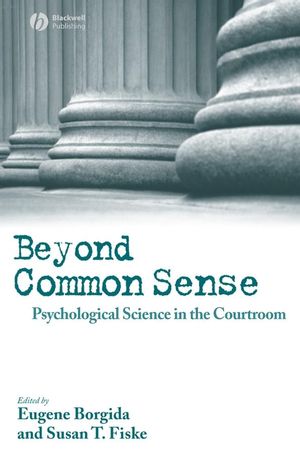Beyond Common Sense: Psychological Science in the CourtroomISBN: 978-1-4051-4574-9
Paperback
448 pages
November 2007, Wiley-Blackwell
 This is a Print-on-Demand title. It will be printed specifically to fill your order. Please allow an additional 10-15 days delivery time. The book is not returnable.
Other Available Formats: Hardcover
|
||||||
“Eugene Borgida and Susan Fiske assembled a distinguished group of psychological scientists to articulate the state of scientific findings on issues of relevance to modern litigation … .I highly recommend this book to a wide variety of audiences … .This is a timely and important volume that should be widely read. It will not be a waste of time.” (Analyses of Social Issues and Public Policy, 2008)
"This collection is a gem! It unmasks the fallacies on race and gender that pass for ‘common sense’ so skillfully that it is hard to read without shouting 'Aha!'"–Nancy Cantor, Chancellor and President, Syracuse University
"This is a timely and extremely interesting analysis of the many
ways in which psychological science can contribute to a more
accurate understanding of various psychological issues often raised
in legal proceedings. This book will be useful, and a very good
read, for the general public as well as the psychological and legal
communities."
–Sharon S. Brehm, Indiana University Bloomington,
President of the American Psychological Association (2007)
"This book is an indispensable guide—for scholars and
practitioners alike—to the psychological science of the legal
system. Its pages are filled with important, hard-won lessons that
we can turn to our advantage or ignore at our peril."
–Daniel Gilbert, Harvard University
"The legal system is also a system of perception, emotion,
interpersonal relations, and judgment. It is thus crucial that
lawyers, social scientists and indeed the broader public understand
its psychological dimensions. This volume assembles key examples of
the recent strides psychologists have made in understanding
courtroom processes and the psychosocial dimensions that shape how
law works in a variety of settings from workplaces to the media. It
will be a vital resource for both professionals and
students."
–Craig Calhoun, President, Social Science Research
Council
"Incrementally, chapter by chapter, this world-class collection
of scholars and researchers upends our common sense understandings
of human prejudice and the law's ability to control it. Yet, just
as importantly, it brings to the fore a vastly deeper understanding
of these issues. It is more than a state of the art collection. It
is a classic collection that, for a long time, will be
indispensable to discussions of prejudice and the law, as well as
the relationship between science and the public good."
–Claude M. Steele, Stanford University



